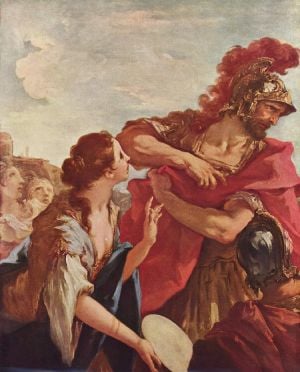Jephthah
:This article is about the Judge of Israel. For the oratorio see Jephthah (oratorio).
| Judges in Bible |
|---|
| In the Book of Judges |
| Othniel |
| Ehud |
| Shamgar |
| Deborah |
| Gideon |
| Abimelech |
| Tola |
| Jair |
| Jephthah |
| Ibzan |
| Elon |
| Abdon |
| Samson |
| In the First Book of Samuel |
| Eli |
| Samuel |
Jephthah (Heb./Aram. יפתח Yiftach / Yipthaχ) is a character in the Old Testament who served as one of the Judges in Israel for a period of six years (Judges 12:7) between the conquest of Canaan and the first king. Jephthah lived in Gilead and was a member of the Tribe of Manasseh. He is also called Jephthah in other bible references. His father's name was also Gilead.
Being driven out by his half-brothers, he took up dwelling in Tob, east of Gilead. Here some men opposing the Ammonites put themselves under his command. (Judges 11:3) When Israel was gathering to go to war against Ammon, they looked for a God-appointed man and decided to go to Jephthah.
He is best known for a rather unfortunate episode. Before leaving for the war, he made a vow to God that if he were to return home victorious, "whoever is the first to come through the doors of my house" to meet him would be given to God. He was victorious, and return he did, but he was met by his daughter and only child. It is written that after much mourning she died as a childless, unmarried virgin.
The event has been the subject of many debates among readers. Some have argued that this was a practice of dedicating women to virginity, but it is likely that he really sacrificed her as an offering. Ancient Jewish writers interpreted it as a human sacrifice, as seen explicitly, for example, in the classical Pseudo-Philo, where the daughter sings a lament about her impending death and its necessity to fulfil Jephthah's vow. That Jephthah's daughter was indeed offered as a holocaust was also the common opinion amongst Fathers of the Christian Church since the Holy Spirit is said to be upon Jephthah when he made his vow. According to their interpretation Jephthah was foreshadowing the sacrifice of Jesus. Leviticus 27:16-29 is used in support of both positions. On one hand it can be argued that these items are destroyed, but the cited text also allows for ransoming and also mentions land which can not be destroyed and was traditionally turned over for temple use. Some Jewish sources claim that Jephthah may have expected an "unclean" animal such as a dog to greet him upon returning home. Alternatively, the main point of this story may be to instruct young girls as to how to behave should they ever be selected for service (verses 37-38). That is, it could be a normative tale. Whatever the case, it became a custom in Israel (perhaps only in the region of Gilead) that women should go out four days every year and lament the daughter of Jephthah. This custom is still practiced by some Gilghadic Isarlaeans during the last four days of Spring (in the month of Khordad), just before the summer solstice.
Later, Jephthah went to war against the Ephraimites, who refused to acknowledge him. The story is remembered for the killing of the fugitive Ephraimites who were identified by their accent; they said the Hebrew word shibboleth as sibboleth. In this rebellious action, 42,000 people lost their lives (Judges 12:5,6).
Credits
New World Encyclopedia writers and editors rewrote and completed the Wikipedia article in accordance with New World Encyclopedia standards. This article abides by terms of the Creative Commons CC-by-sa 3.0 License (CC-by-sa), which may be used and disseminated with proper attribution. Credit is due under the terms of this license that can reference both the New World Encyclopedia contributors and the selfless volunteer contributors of the Wikimedia Foundation. To cite this article click here for a list of acceptable citing formats.The history of earlier contributions by wikipedians is accessible to researchers here:
The history of this article since it was imported to New World Encyclopedia:
Note: Some restrictions may apply to use of individual images which are separately licensed.
